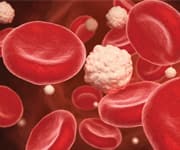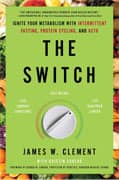Life Extension Magazine®

Calorie restriction [is] now established to be the most powerful intervention to delay aging and increase longevity in diverse species, from yeast to mammals.
Wouldn’t it be great if losing weight, easing chronic conditions, and staying healthier, longer was as simple as flipping a switch?
As James Clement reveals in his new book, The Switch, it is.
Our bodies contain a metabolic switch that, when activated, initiates fat burning, removes damaged and dysfunctional cells, and dampens inflammation.
As a result, activating this switch can help promote weight loss, reduce the risk of major diseases, and slow down the aging process.
In this interview with Life Extension®, Clement shares a few of the specific details from his highly acclaimed book on how to activate your body’s anti-aging switch.
—Laurie Mathena
LE: What would you say is the secret to living a long, healthy life?

Clement: In your own grasp of the “secrets” of living a good, long life, what comes to mind? My bet is that you think of blood sugar balance, healthy weight, and physical fitness.
Those are all appropriate goals to achieve, but they miss the main point—they are merely a means of sparking a prominent antiaging process: autophagy.
[Autophagy is] how the body removes and recycles dangerous, damaged organelles and particles, as well as pathogens, from inside cells, thus aiding your immune system and greatly reducing your risk of developing cancer, heart disease, chronic inflammation, osteoarthritis, and neurological disorders from depression to dementia.
Autophagy makes us more physiologically efficient by getting rid of defective parts, promoting healthy metabolism, stopping cancerous growths, and preventing metabolic disorders such as obesity and diabetes—which means that by boosting your body’s autophagy, you dampen inflammation, slow down the aging process, reduce your risk of developing certain diseases, and optimize your biological function.
LE: How can autophagy be turned on in the body?
Clement: Autophagy can be triggered when a certain complex, called mTOR, within cells is turned down. I refer to the mTOR complex as “the Switch.”
mTOR is the switch that nearly every cell (except blood cells) has, and it either activates your cell’s self-cleaning mode (autophagy), ridding the body of toxic materials and fomenting cancers, as well as burning fat, or allows the body to produce more proteins, store as much energy (glucose and fat) as possible, and build more cells.
These anabolic processes, when taken to an extreme level, which our modern lifestyle practices do, can trigger illness.
Think of this switch like a dimmer for your lights: turning it toward one end to increase light and the other direction to decrease it.
Although we evolved to have this biological switch move back and forth continuously between growth (mTOR) and repair (autophagy, and sometimes repair for prolonged periods), the lifestyles of modern humans keep it turned toward growth constantly and seldom or never in the repair direction.
And when it’s in the growth stage, internal cell cleansing comes to a halt and our ability to clear out the biological debris—misfolded proteins, pathogens, and dysfunctional organelles—falters.
LE: What is the connection between this switch and lifespan?
Clement: Virtually all health-extending and lifespan-extending interventions that we know of have their effects because of their actions to suppress this switch.
Much of [my] book [details] how these various interventions, some of which you may have heard of and others of which you haven’t, act on this pathway and ultimately regulate this important switch, periodically turning on autophagy in the process.
The information is meant to help reverse this hastening of aging and put us back onto a more natural path of consumption and exercise that keeps the Switch (mTOR and autophagy) in balance and prevents the age-related diseases that were rare centuries ago but are widespread now.
LE: In your book, you talk about a few specific ways to change the direction of this metabolic switch: calorie restriction, intermittent fasting, and very-low-carb diets.
Clement: Researchers discovered nearly 80 years ago that both calorie restriction and intermittent fasting greatly extended the lives of test animals, often by reducing their vulnerability to cancer and heart disease.
A ketogenic (very-low-carbohydrate) diet, widely used for the treatment of neurological diseases, showed somewhat similar anticancer and anti-heart-disease benefits, although it has been investigated much less than calorie restriction or intermittent fasting.
After three months of reading through more than 500 scientific papers, it finally dawned on me that all of the papers I’d been reading about life-extending, disease-preventing genes, therapies, drugs, vitamins/supplements, lifestyles, and so on had one thing in common: they turned down the mTOR cellular mechanism and thereby turned up the autophagy process.
I spent another three months reading 600 more papers focused on mTOR and autophagy and confirmed my suspicion.
LE: What is intermittent fasting, and how does it trigger autophagy?
Clement: Intermittent fasting (a form of which is called time-restricted eating) works because it activates the hormone glucagon, which functions opposite of insulin to keep your blood glucose levels balanced.
Here’s a visual to really grasp this concept. Picture a seesaw: when one person goes up, the other goes down. This analogy is frequently used to explain the biological insulin-glucagon relationship. In your body, if the insulin level goes up, the glucagon level goes down and vice versa.
When you give your body food, your insulin level rises and your glucagon level decreases. But the opposite happens when you don’t eat: your insulin level goes down and your glucagon level rises.
When your glucagon level rises, it triggers autophagy. This is why temporarily denying your body nutrients through the safe practice of intermittent fasting is one of the best ways to boost the integrity of your cells.
Aside from maintaining your cells’ youth, research has shown that intermittent fasting promotes greater energy, increased fat burning, and decreased risk of developing diseases such as diabetes and heart disease, all due to its ability to activate autophagy.
LE: How do you put intermittent fasting into practice?
Clement: You can start with a very comfortable 12-hour fast just by avoiding eating after 7 p.m. (No midnight snacking!) Then you can stretch it to 16 hours and eventually forgo “break-fast” (breakfast) the next morning, so your first meal of the day is around 11 a.m.
LE: Another way to encourage autophagy is through calorie restriction. Can you explain that in more detail?
Clement: By definition, calorie restriction involves the consumption of fewer calories without malnutrition or deprivation of essential nutrients.
Although the molecular mechanisms that control the effects of calorie restriction are still being studied and debated, there is more widespread acceptance of the hypothesis that calorie restriction and lifespan extension involve a dialing down of insulin signaling and a dialing up of autophagy.
Calorie restriction [is] now established to be the most powerful intervention to delay aging and increase longevity in diverse species, from yeast to mammals. It is also the most potent and reproducible physiological intervention to protect against cancer specifically in mammals.
LE: What happens in the body when it’s deprived of an abundance of calories?
Clement: The effects of calorie restriction on growth hormone, and in turn, levels of insulin and IGF-1, are certainly important to keeping your “growth” switch (mTOR) turned down so that your self-cleaning process (autophagy) is tuned up.
With less growth hormone around, there’s increased autophagy to clean house. And what’s the relationship between calorie restriction and autophagy?
When you put mild stress on the body in the form of calorie restriction, it turns up the autophagy dial. As that happens, there’s an increase in protein turnover and cellular repair.
In other words, your body is forced to renovate itself!

LE: How does protein restriction factor in?
Clement: Another key dietary strategy that is often ignored is protein restriction. That’s right: you don’t want to be eating too much protein.
Although the practice of general calorie restriction has benefits for body weight, it’s really the protein restriction that creates the health benefits.
If cutting way back on your calorie consumption sounds like a horrendous proposition and you don’t need to lose weight, I’ve got good news for you: restriction of protein consumption—without restricting calories—is among the most promising interventions that have emerged to promote healthy aging in humans. And it’s not going to feel as though you’re “restricting” yourself, which is why it’s better to call it protein cycling.
I cannot emphasize the following enough: protein stimulates insulin release as much as carbohydrate does! We often don’t think about that because we tend to relate insulin release with only sugar.
One of insulin’s jobs is to send amino acids from broken-down proteins into lean tissues such as muscle. But here’s the difference: protein doesn’t supply glucose rapidly, as carbohydrate does.
LE: How does this relate to autophagy?
Clement: When you reduce your protein intake, especially animal proteins, you will lower your insulin levels and in turn boost your glucagon level and activate autophagy. This explains why protein cycling, or reducing your protein intake in cyclical fashion, has an effect similar to that of fasting.
In addition to enhancing autophagy, protein cycling alongside calorie restriction and intermittent fasting will help reduce your risk of developing the diseases I’ve covered: diabetes, cancer, and heart disease.
Remember, these are the diseases of civilization, also known as diseases of overconsumption.
Protein cycling could become your most powerful tool for making over your metabolism and increasing your chances of living a long, disease-free life. This is especially helpful for people who find it unrealistic to commit to the rigors of calorie restriction and fasting.
LE: These sound like great ways to keep the Switch turned off. Is this something that should be practiced all the time?

Clement: As with most everything in life, you’ll want to strike a balance between your Switch being on and being off. The body needs periods of rest from its internal cleansing mechanisms so you can more easily build tissues, keep your weight in check (not lose too much), and maintain your immune system.
You’ll want to dial up autophagy for eight months of the year and dial it down during the other four months. It doesn’t really matter how you break up those months (e.g., you can do two months with autophagy on and one month off, then repeat for a full calendar year).
Remember, autophagy is an action plan or tool for cellular self-fortification, but it also demands a balance as with so many other things in life: too much or not enough can be harmful to the cell, and thus to you.
If you have any questions on the scientific content of this article, please call a Life Extension® Wellness Specialist at 1-866-864-3027.
From THE SWITCH by James W. Clement. Copyright © 2019 by James W. Clement. Reprinted by permission of Gallery Books, an Imprint of Simon & Schuster, Inc.
To order a copy of The Switch, call 1-800-544-4440.

